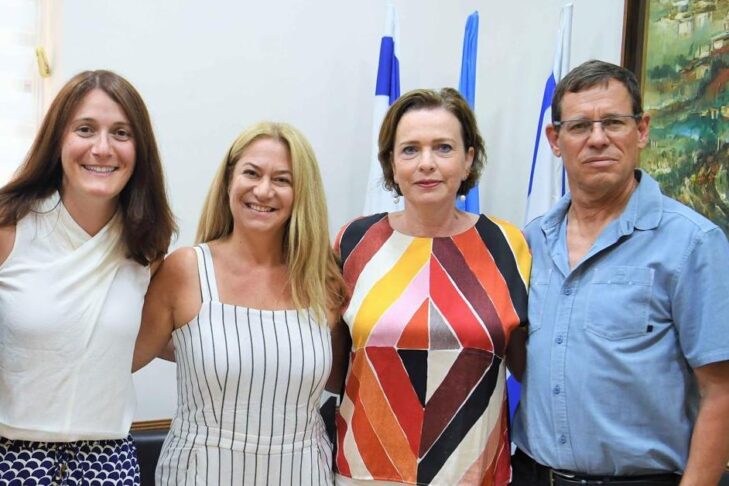Reflecting on the past, present, and future of the partnership between Boston and Haifa, Combined Jewish Philanthropies (CJP) president and CEO Rabbi Marc Baker recently spoke with JewishBoston.com about the long-standing relationship between the two communities, united in purpose, 5,000 miles apart.
Tell us about CJP’s partnership with Haifa.
This year, CJP marks 31 years of partnership with Haifa. The Boston-Haifa Connection (BHC) is based on a simple idea: The best way to bring our communities and our people closer is through building relationships and addressing challenges together.
What does that look like in 2021?
Working side-by-side, staff and volunteers from both Boston and Haifa support at-risk families in Haifa, foster Jewish identity in both communities, connect youth in Boston and Haifa, and empower change-makers in our communities.
Our Boston-Haifa platform relies not only on organizational partnerships but also on a thriving network of volunteers in Israel and in Boston. These community members bring their extensive skills, time, and resources to our work and help us advance our goals enriching the quality of services and programs.
What are the current objectives of your partnership?
Today, our work is focused in three areas. These include: identifying and investing in young adult leaders who are making our communities more connected, equitable, and resilient; promoting a more equitable society based on mutual respect and understanding by investing in high-impact partnerships that strengthen vulnerable populations in Haifa; and inspiring joy and pride in our rich and diverse Jewish identity and building connections among Jewish people worldwide through shared experiences, education, and joint initiatives that foster belonging, meaning, and shared responsibility.
What has been the role with the Haifa Municipality?
Clear examples of successful partnership models between the Municipality and the Boston-Haifa Connection have been the establishment of major initiatives like Shiluvim for service integration for the Ethiopian Israeli community of Haifa and Horim Bamercaz (Parents at the Center). Parents at the Center (PAC) is a revolutionary model conceived, developed, and executed in partnership between CJP professionals, volunteers with Municipal leadership (from the Education and Social Welfare departments), and volunteers from Haifa.
Together, we identified areas of unmet needs around at-risk youth and families and created a neighborhood approach of prevention and support in a multidisciplinary way. The Municipality selected Kiryat Eliezer and Bat Galim—home to Russian immigrants (olim), Israeli Arabs, Ethiopian Israelis, and veteran Jews—for the center and pilot program. In addition to valuable services for these families, PAC brought together and trained a wide range of city professionals who work in early childhood, building a robust network of social workers, clinicians, educators, health workers, etc.
Today, the program is fully run by the Municipality with some financial and advisory support from CJP, while nationally, it was picked up by the Israeli Ministry of Education as a leading model for parental engagement in early childhood for other cities to replicate and implement.
What are the goals of the partnership moving forward?
Our goal is to promote a more equitable society based on mutual respect and understanding by investing in high-impact partnerships that strengthen vulnerable populations in Haifa.
We are working with the Ethiopian Israeli community and others to develop educational programs for youth from neighborhoods and communities that lack sufficient resources to prepare them for successful and meaningful entry into the army; build support networks that will improve the likelihood of a successful experience and completion of IDF service; help families understand the role and requirements of the IDF in order to foster support and encouragement; and expand employment and higher education opportunities for released soldiers.
In addition, we are creating improved employment opportunities that will lead to greater economic and social mobility by providing employment skills trainings to individuals, ages 20-50, from the Ethiopian Israeli community and other disadvantaged groups.
We are supporting systems, fostering greater understanding between community members, and building a foundation for improved social and educational experiences for at-risk families in Haifa.
Why do you believe this partnership has remained so strong for more than 30 years?
The success of the Boston-Haifa partnership is a testament to what an authentic, deep, honest collaboration can achieve between an American Federation and an Israeli city. Our ambitious goals to build relationships and tackle critical challenges with innovative solutions could not have happened without our longstanding partnership with the Haifa mayor and the Municipality and its dedicated professionals over the last three decades—a partnership that even continues through COVID-19. From education to immigration, from social services to empowering young adult leaders, our commitment to each other has generated impactful solutions that continue to benefit our two communities in meaningful ways.

